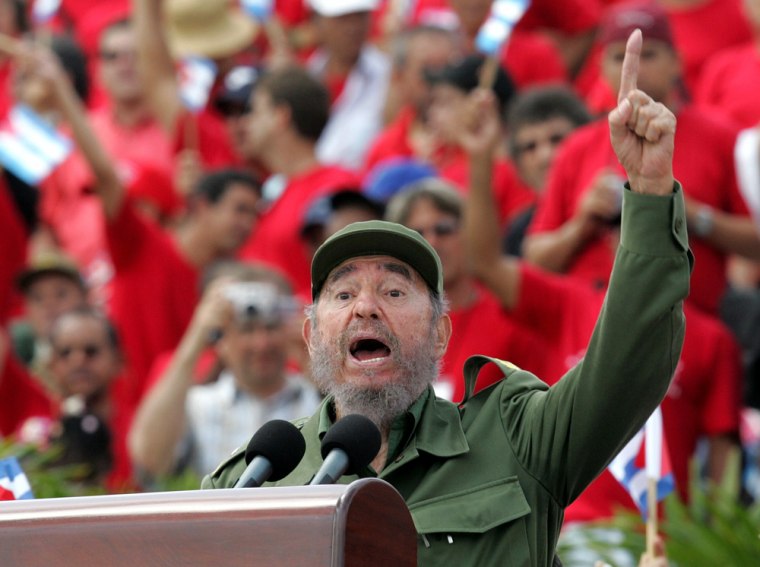Cuban President Fidel Castro, leader of one of the world’s last communist regimes, commemorated May Day on Sunday by demanding the United States expel a Cuban-born militant accused of blowing up a civilian jetliner. Elsewhere in the world, millions of workers staged largely peaceful rallies to press for better conditions or protest government policies.
But in Moscow, celebrations of the international workers’ holiday turned violent when radical activists from the National Bolshevik Party and the Red Youth Avant-Garde political group clashed with riot police after several activists were detained.
In Zimbabwe, despite earlier fears of a ban on May Day gatherings, the southern African country’s umbrella group of trade unions held 17 rallies to celebrate the workers’ day holiday with no police interference.
China used the day to single out thousands of laborers and a few athletes for recognition, dubbing them ’model workers,’ while the weeklong labor day holiday started with visits to squares and parks for kite flying and recreation.
Wage demands
Up to 5,000 Bangladeshis demanded the country’s first ever minimum wage — $50 a month. The South Asian country has 1.8 million workers in about 2,500 garment factories, exporting more than $5 billion in textiles each year.
Thousands of Russian communists rallied in Moscow under pictures of Lenin and Stalin, while tens of thousands of labor union workers and opposition activists denounced social reforms that replaced subsidized medicines, utilities and transport with cash payments.
More than 500,000 Germans staged rallies, with many accusing company executives of increasing earnings while squeezing workers’ wages and slashing jobs.
Overnight, 69 people were detained after a street party in eastern Berlin deteriorated into a riot. Spike-haired punks and other demonstrators threw stones and bottles at officers patrolling the event, police said. Three people were lightly injured in the clashes, according to police.
Terror charge
Flanked by aides in red T-shirts, Castro looked out at hundreds of thousands in vast Plaza of the Revolution and demanded Washington expel Luis Posada Carriles accused of masterminding the bombing of a Cuban jetliner in 1976 that killed 73 people. Posada denies involvement.
The Cuban president said the case of Posada, who is seeking asylum in the United States, “shows the world the immense hypocrisy, the lies, the immoralities and the cynicism” of the U.S. government, which has kept Cuba on a list of terrorist states for years.
Castro called Posada “the most famous and cruel terrorist of the Western hemisphere.”
Posada, now 77, along with three associates were imprisoned in Panama in an alleged plot in 2000 to kill Castro at a conference in Panama. They were pardoned last year by outgoing President Mireya Moscoso and Posada has not been seen publicly since then.
Posada’s lawyer, Eduardo Soto, says his client worked for the CIA for years and deserves asylum because he would face possible execution if returned to Cuba.
Cuban officials say Posada was involved in many attacks. He has acknowledged planning bombings of Cuban hotels, one of which killed Italian tourist Fabio di Celmo.
Drawing parallels between attacks on Cuba and those on the United States, organizers included brief speeches by di Celmo’s father Giustino as well as a man whose fiance was killed in the Sept. 11, 2001, attack on the United States.
In France, far-right leader Jean-Marie Le Pen marked the workers’ holiday by urging his countrymen to reject the European Union constitution in a May 29 referendum.
Tens of thousands of women from southern Asian countries who work as domestic helpers in wealthy Hong Kong dominated marches there, demanding fixed working hours and a minimum wage for all employees.
Hundreds of thousands of Japanese workers rallied for a global ban on nuclear weapons, ahead of the 60th anniversary of Japan’s World War II surrender on Aug. 15, 1945, after U.S. planes dropped atomic bombs on the cities of Hiroshima and Nagasaski.
